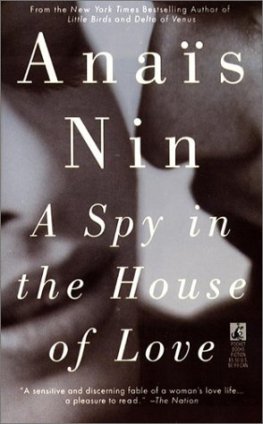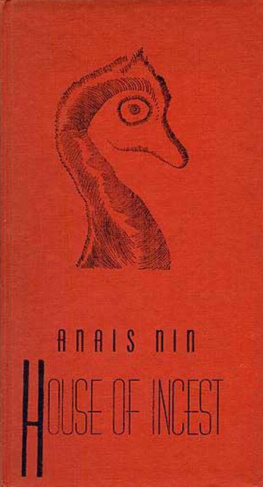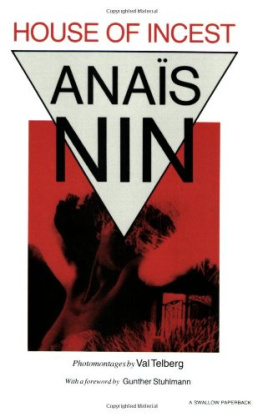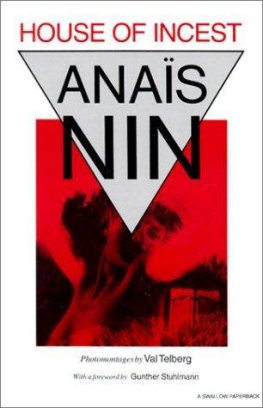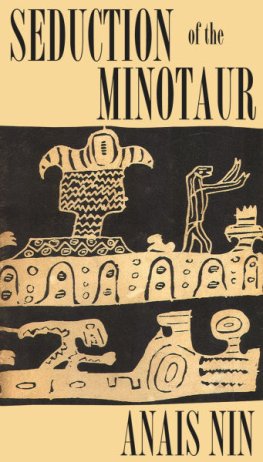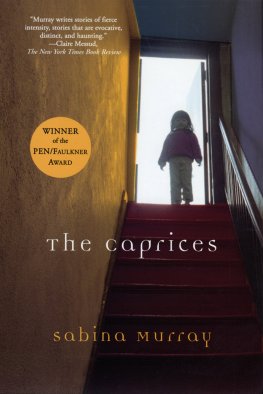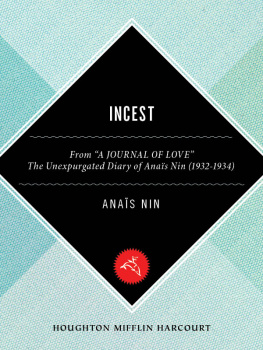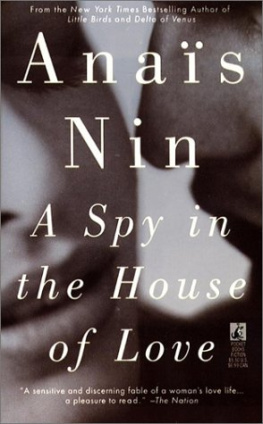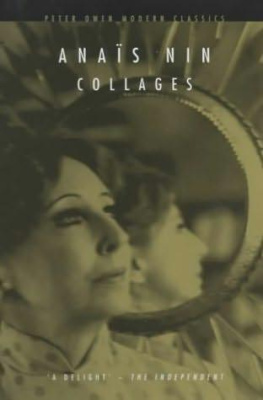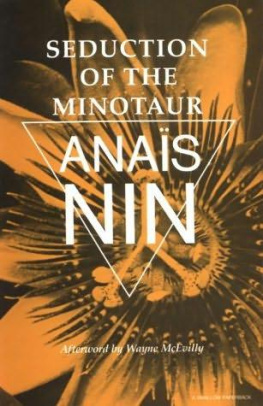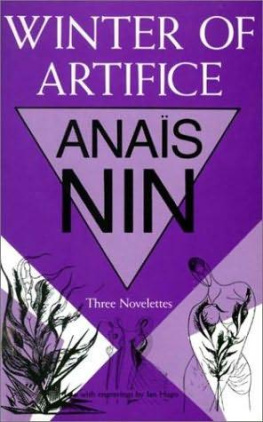Anas Nin
A SPY IN THE HOUSE OF LOVE
THE LIE DETECTOR WAS ASLEEP when he heard the telephone ringing.
At first he believed it was the clock ordering him to rise, but then he awakened completely and remembered his profession.
The voice he heard was rusty, as if disguised. He could not distinguish what altered it: alcohol, drugs, anxiety or fear.
It was a womans voice; but it could have been an adolescent imitating a woman, or a woman imitating an adolescent.
What is it? he asked. Hello. Hello. Hello.
I had to talk to someone; I cant sleep. I had to call someone.
You have something to confess
To confess? echoed the voice incredulously; this time, the ascending tonalities unmistakably feminine.
Dont you know who I am?
No, I just dialed blindly. Ive done this before. It is good to hear a voice in the middle of the night, thats all.
Why a stranger? You could call a friend.
A stranger doesnt ask questions.
But its my profession to ask questions.
Who are you?
A lie detector.
There was a long silence after his words. The lie detector expected her to hang up. But he heard her cough through the telephone.
Are you there?
Yes.
I thought you would hang up.
There was laughter through the telephone, a lax, spangled, spiraling laughter. But you dont practice your profession over the telephone!
Its true. Yet you wouldnt have called me if you were innocent. Guilt is the one burden human beings cant bear alone. As soon as a crime is committed, there is a telephone call, or a confession to strangers.
There was no crime.
There is only one relief: to confess, to be caught, tried, punished. Thats the ideal of every criminal. But its not quite so simple. Only half of the self wants to atone, to be freed of the torments of guilt. The other half of man wants to continue to be free. So only half of the self surrenders, calling out catch me, while the other half creates obstacles, difficulties; seeks to escape. Its a flirtation with justice. If justice is nimble, it will follow the clue with the criminals help. If not, the criminal will take care of his own atonement.
Is that worse?
I think so. I think we are more severe judges of our own acts than professional judges. We judge our thoughts, our intents, our secret curses, our secret hates, not only our acts.
She hung up.
The lie detector called up the operator, gave orders to have the call traced. It came from a bar. Half an hour later, he was sitting there.
He did not allow his eyes to roam or examine. He wanted his ears alone to be attentive, that he might recognize the voice.
When she ordered a drink, he lifted his eyes from his newspaper.
Dressed in red and silver, she evoked the sounds and imagery of fire engines as they tore through the streets of New York, alarming the heart with the violent gong of catastrophe; all dressed in red and silver, the tearing red and silver cutting a pathway through the flesh. The first time he looked at her he felt: everything will burn!
Out of the red and silver and the long cry of alarm to the poet who survives in all human beings, as the child survives in him; to this poet she threw an unexpected ladder in the middle of the city and ordained, Climb!
As she appeared, the orderly alignment of the city gave way before this ladder one was invited to climb, standing straight in space like the ladder of Baron Munchhausen which led to the sky.
Only her ladder led to fire.
He looked at her again with a professional frown.
She could not sit still. She talked profusely and continuously with a feverish breathlessness like one in fear of silence. She sat as if she could not bear to sit for long; and, when she rose to buy cigarettes, she was equally eager to return to her seat. Impatient, alert, watchful, as if in dread of being attacked, restless and keen, she drank hurriedly; she smiled so swiftly that he was not even certain it had been a smile; she listened only partially to what was being said to her; and, even when someone in the bar leaned over and shouted a name in her direction, she did not respond at first, as if it were not her own.
Sabina! shouted the man from the bar, leaning towards her perilously but not losing his grip on the back of his chair for fear of toppling.
Someone nearer to her gallantly repeated the name for her, which she finally acknowledged as her own. At this moment, the lie detector threw off the iridescence which the night, the voice, the drug of sleep and her presence had created in him, and determined that she behaved like someone who had all the symptoms of guilt: her way of looking at the door of the bar, as if expecting the proper moment to make her escape; her unpremeditated talk, without continuity; her erratic and sudden gestures, unrelated to her talk; the chaos of her phrases; her sudden, sulky silences.
As friends drifted towards her, sat with her, and then drifted away to other tables, she was forced to raise her voice, usually low, to be heard above the cajoling blues.
She was talking about a party at which indistinct incidents had taken place, hazy scenes from which the lie detector could not distinguish the heroine or the victim; talking a broken dream, with spaces, reversals, retractions, and galloping fantasies. She was now in Morocco visiting the baths with the native women, sharing their pumice stone, and learning from the prostitutes how to paint her eyes with kohl from the market place. Its coal dust, and you place it right inside the eyes. It smarts at first, and you want to cry; but that spreads it out on the eyelids, and that is how they get that shiny, coal black rim around the eyes.
Didnt you get an infection? asked someone at her right whom the lie detector could not see clearly, an indistinct personage she disregarded even as she answered, Oh, no, the prostitutes have the kohl blessed at the mosque. And then, when everyone laughed at this which she did not consider humorous, she laughed with them; and now it was as if all she had said had been written on a huge blackboard, and she took a sponge and effaced it all by a phrase which left in suspense who had been at the baths; or, perhaps, this was a story she had read, or heard at a bar; and, as soon as it was erased in the mind of her listeners, she began another
The faces and the figures of her personages appeared only half drawn; and, when the lie detector had just begun to perceive them, another face and figure were interposed as in a dream. And when he believed she had been talking about a woman, it turned out that it was not a woman, but a man; and when the image of the man began to form, it turned out the lie detector had not heard aright-ies. She was a young man who resembled a woman who had once taken care of Sabina; and this young man was instantly metamorphosed into a group of people who had humiliated her one night.
He could not retain a sequence of the people she had loved, hated, escaped from, any more than he could keep track of the changes in her personal appearance by phrases such as at that time my hair was blond, at that time I was married, and who it was that had been forgotten or betrayed; and when in desperation he clung to the recurrences of certain words, they formed no design by their repetition, but rather an absolute contradiction. The word actress recurred most persistently; and yet the lie detector could not, after hours of detection, tell whether she was an actress, or wanted to be one, or was pretending.
She was compelled by a confessional fever which forced her into lifting a corner of the veil, and then frightened when anyone listened too attentively. She repeatedly took a giant sponge and erased all she had said by absolute denial, as if this confusion were in itself a mantle of protection.

